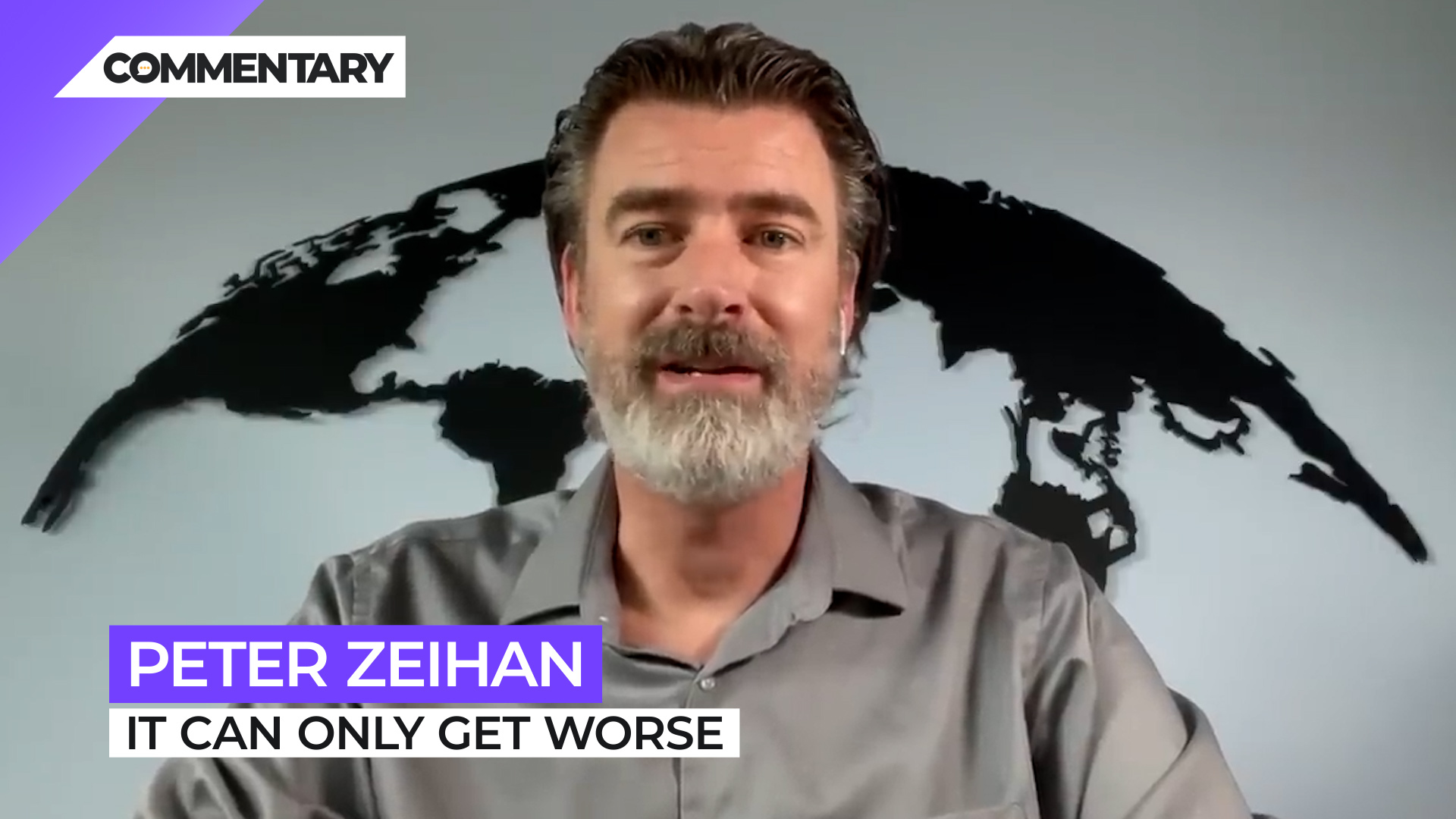
Commentary
-
Our commentary partners will help you reach your own conclusions on complex topics.
Everyone, Peter Zion here coming to you from home in Colorado, I am still in a bit of shock after finding out that the new book made it onto the bestseller list with the New York Times, we’ll be finding out the Wall Street Journal here in a couple of days. So you know, but we’re already well past point at the point of where I thought we were going to be. So hooray. So for those of you who have bought a copy, or have been spreading the news, thank you so much, I really appreciate it. For those of you who are new, it is number 12. On the bestseller list. And unlike my previous work at the end of the world is just the beginning is largely about the economic future in the world on the back side of globalization, whether it’s because of geopolitics or demography, the world we’ve been living in is already past its peak, and it’s in the process of falling apart. And the book explores what that means based on where you are and what you care about. Now, whenever someone makes it onto the list, there is a an aftermarket rush for their previous works. And end of the world is just the beginning is my fourth book, actually, I’ve got three others, and I wanted to share a little bit about them not because I’m trying to sell books here, or at least that’s not the primary reason. But because we are giving all of the sales from the first three books to a specific charity until further notice.
So a little bit of the backstory. When the Ukrainians found themselves under assault from the Russians starting on February 22. The general belief in Ukraine in Europe in the United States hear me was that this was going to be a relatively quick war. Sure, the Ukrainians had proven that they actually have a national identity now, and they didn’t 10 years ago. And so there were debates about whether this was over in a month or three months or six months, I went for six. But there was not a lot of hope, in a lot of sectors that the red Koreans could really stand up in any meaningful way. And wow, wow, have they outperformed. And that has encouraged different countries to draw different lessons. So you may recall on the third day of the war, back in February, that the Russians had a 40 mile long convoy of military vehicles advancing South out of Belarus, which is their Patsey country, stooge, satellite, use it, whatever, whatever negative word you’d like, it’s probably appropriate. Towards Kyiv and 24 hours in, they stopped, because they forgot to bring fuel tanks with them. And two days after that, a lot of the soldiers had to dismount and walk back to Belarus because they forgot food trucks as well. And in some circles, this made people really excited because it showed that the Russians didn’t know how to fight a modern war. But for the Russians, this is an issue of existential conflict for them of survival. They see that if they can’t afford position troops into a series of geopolitical gateways to their West, that the next time that someone attacks them, yes, they’re not expecting that right now. But Russia has been invaded 50 times in their history, they’re pretty sure it’s going to happen again, at some point. They fear if they can’t position their troops now that they never will, the Russian ethnicity is Dynatrace, like a lot of others around the world. And they’re geographically vulnerable. So they saw this as their last chance. And if they can’t fight a real war by Western standards, that’s a problem. Because the Russians see this as an issue of survival, which means they are willing to use nukes because they know if they don’t, and they fail in the conventional war, and Russia ceases to exist in about 20 years. It’s a reasonable fear, I think it’s accurate, but other countries Drew. So from the western point of view, that means we have to provide the Ukrainians with that weapon systems they can use with a minimal of training without American forces being required there for the logistics. That way, the war stays bottled up in Ukraine, and we don’t get a direct West NATO confrontation that the Russians know that they would lose that the West knows the Russians would lose, and that would induce them to consider nukes. We can’t allow that to happen. Keep the war in Ukraine. The Russians drew their own conclusions. Theirs was that they had been drinking their own Kool Aid a little bit too much. And the Ukrainians were never going to walk them in his lip. Welcome them in as liberators. And so the solution was to simply destroy them as a people.
So the Russians have gone back to their pre World War One playbook, and advancing slowly under a mass dumb artillery, and specifically targeting not just anything that moves, but anything that doesn’t move any sort of civilian infrastructure, especially if it’s agricultural in nature. And so we have now seen that around car kit and we’ve seen that in Marissa pool, and we’ve seen that on the outsides of Nikolaev and of course throughout danske and Lynette or sorry, Luhansk and Donetsk provinces. The Russians are just physically obliterating everything they come across, because that turns the Ukrainian population and put them into two groups, group one Under refugees, you never have to worry about them again. And the second one, you can treat as subhuman and either shoot them, sell them into slavery, kidnap the kids, send them off to Siberia to be come Russian or whatever else that destroys the existence of either the Ukrainian identity, or of Ukrainians proper. At present between the internally displaced people in Ukraine and the refugees, that’s already 15 million people. That’s a third of the pre war population. Even if somehow, Ukraine manages to win this war, this is still the end of Ukraine as a country within 30 years, because they literally no longer have the people, it was already bad. But now there’s a demographic bomb that’s been set off under him and it’s already exploded, the damage has already been done been done, it can only get worse.
To that end, as I know, geopolitics. That’s my consulting firm, is providing all of the proceeds from all of the sales of all of the format’s of the first three books to a group called the off your foundation. So real quick on the books and then on off. Yeah. So number one accidental superpower. This was the freshman book that came out back in 2015. Let’s call it 2015. That sounds good. Anyway, this was the book that kind of gives you an idea of how I see the world, whether it’s energy or food, or demography, or geography, how the factories the shape, success and failures of countries, and how if you play them forward, as the Americans disengaged from the world, things will play out which countries win from that which ones lose, which ones will still be partners, which ones will be competitors. Second up, absent superpower, this is the one I had a hard time finding a publisher for because you’ll notice that in the subtitle, the word shale is there and the word evil is not directly attached. So I could not find a publisher anywhere in the United States that would pick it up. In fact, there are very few energy books in this era out at all. So this starts with the shale revolution plays it forward shows how the first and second round technologies are going to mature as we move on. A lot of this really has come true, I think an overall accuracy rating. This is by far my best book. All parents say they don’t have a favorite child. All parents lie. This one’s mine. And, you know, the specific interest for what’s going on right now with the Ukraine war, is there is a full chapter in here called the Twilight war is which details what the Russians will do when they realize they’re dying and running out of time. And we are in that war right now. Ukraine is not the end of the story. Ukraine is the beginning of the story. And there are another 15 countries that are going to be involved in one way or another before it’s over. Okay, so that was like 2017 Maybe book number three disunited nations. This was from a commercial point of view, the one that was doing best until the most recent release just United Nations looks at the countries that everyone knows knows positive knows that they’re going to be the countries of the future. You’re Brazil’s your Saudi Arabia’s your Russia’s, your China’s. And it takes a big steaming dump on all of them, and offers up in exchange a list of the countries that will actually rise to dominate the human condition, not just the United States, but also France and Japan, and Turkey and origin. Freakin Tina. So I had a lot of fun writing this one, I had confidence that most of my jokes were gonna get through edit, because I realized I could say no to the editor, and it’s pretty fun. Okay, so those are the three new ones. And let’s talk about Ayfa. Afya is providing medical assistance to the entirety of the Ukrainian refugee community. And recently, they’ve even started getting some medical teams into Ukraine proper to help closer to the front. Very risky stuff, very dangerous stuff. I am not brave enough to try to help them with that. I am brave enough to try to work with my network. However, to get them assistance wherever they can. That includes you. There are three ways you can help. Number one, what four ways to help you can you can buy a book and I’ll take care of the donation for you. And number two, you can go to off your foundation.org yourself and make your own donation. Option number three is that Avia has built an Amazon page, you know how we have marriage lists where you like go to a store and the bride and groom have already been there and they’ve scanned everything they want, you can pick something from the list. Amazon does something like that, too. And Aki has basically built an Amazon page that lists out all the things that they have in short supply. So bandages, amputation kits, whatever it happens to be. Just keep in mind before you click add to cart that you change the number of the things you’re going to buy. So I think it’s like 500 and every item and you’d not want to come up with 500 amputation kits. It’s not that they couldn’t use them, but you might not want to pay for that many. So you just put it in your cart when you shop. Move on It will be sent to their their packaging facility in Yonkers, New York, and they will take it from there. And then fourth, and potentially most importantly, here is until the Ukraine were off, it was kind of flying under the radar, they did a lot of the nuts and bolts that allowed people to survive. But it wasn’t really glamorous work. I mean, they are basically taking used medical equipment or medical equipment that hasn’t been used, but has expired. And so hospitals have to get rid of it off yet takes it and then transports it to where it needs to go. So they’re kind of the nuts and bolts of the humanitarian community and a number of countries, Ukraine simply being the one where they’re doing the most work at the moment. That’s great, but it does mean they need some help, because they have to get that equipment first. So if you are affiliated with a hospital or know someone it is we have attached a flyer after this message, where you can basically give it to the person in question who’s in the logistics or the Supply Chain system with a hospital and anything that they have that a surplus that would have to be destroyed, all they have to do is at a lower cost, ship it to New York, and then off yet we’ll do the expensive, difficult part of getting it to Europe and then getting it into the hands of the people who need it, either on the borders of Ukraine or in Ukraine proper. So they just need help with that first part getting the equipment that was going to be disposed of.
Anyway. All right. That’s everything from me. We’re going to continue on with newsletters as proves relevant for those of you who are new, this newsletter is free, it will always be free. I try to put out as often as I can, especially based on the news of the day. Since COVID has kind of wound down a little bit in the United States and Ukraine is war that has been a lot more often than normal. Sometimes I’m having five and six a week. It’s usually not that fast. I’ll never ask you for money, but I will ask you to support groups like Feeding America during the COVID pandemic. And AFYA foundation during the Ukraine war, we try to pick a we try to pick a charity that has found a lever and just needs a little bit of help to do an outsize amount of good. Okay, that’s everything for me. Until next time.
-
Weighing social costs vs. economic benefits on immigration
Global human migration is one of the defining elements of our current historical era, according to the United Nations. Migrants face both the incentives to leave — forced out by climate change, crime and corruption, extreme poverty or violence — and incentives for where to go, based on available job opportunities and so on. Migration… -
How Israel blew up pagers and radios in Lebanon
Walkie-talkies exploded across Lebanon on Wednesday, Sept. 18, killing at least 20 people and wounding 450 in a new attack targeting Hezbollah. The attack came just one day after pager explosions killed at least 12 people and injured thousands across the country. Israel, widely believed to be behind the attacks, declared that a “new era”… -
The future of US-Saudi relations
U.S.-Arab relations in the Persian Gulf have historically tried to balance conflicting political interests against shared economic interests. As globalization declines and economic “friend-shoring” becomes the default, that delicate balance may become jeopardized. How will U.S.-Arab relations, and specifically U.S.-Saudi relations, evolve and adapt to these new conditions? Watch the above video as Straight Arrow… -
The impact of hurricanes on oil and energy supplies
Gulf hurricanes are notoriously devastating, carrying floods, storms and economic fallout deep into the interior of the continental United States, to say nothing of the coastal and island communities that they impact. But how much disruption do these hurricanes cause to oil production and energy supplies? Watch the above video as Straight Arrow News contributor… -
The future of Taiwan and advanced semiconductor chips
The looming possibility of a Chinese military invasion of Taiwan has raised fears about a global disruption of advanced semiconductor chips, many of which are produced in and then exported from Taiwan. Some companies are attempting to catch up to Taiwan’s advanced chip production by scaling up production in the U.S. or elsewhere, but it…
Latest Stories
-

Does Fed rate cut plus falling mortgage rates equal more affordable housing?
-
 Reuters
Reuters
Georgia Election Board approves ballot hand count despite AG warning
-
 Reuters
Reuters
Sean ‘Diddy’ Combs placed on suicide watch in Brooklyn after arrest
-
 AP Images
AP Images
Report shows Secret Service 'failures' before Trump assassination attempt
-
 Getty Images
Getty Images
Muslim voters turn to Jill Stein over Kamala Harris in Mich., other key states
Popular Opinions
-
In addition to the facts, we believe it’s vital to hear perspectives from all sides of the political spectrum.
Latest Opinions
In addition to the facts, we believe it’s vital to hear perspectives from all sides of the political spectrum. We hope these different voices will help you reach your own conclusions.
The opinions published in this section are solely those of the contributors and do not reflect the views of Straight Arrow News.

















Latest Commentary
We know it is important to hear from a diverse range of observers on the complex topics we face and believe our commentary partners will help you reach your own conclusions.
The commentaries published in this section are solely those of the contributors and do not reflect the views of Straight Arrow News.
Peter Zeihan
Geopolitical StrategistHow Israel blew up pagers and radios in Lebanon
The future of US-Saudi relations
The impact of hurricanes on oil and energy supplies
Dr. Frank Luntz
Pollster and Political Analyst‘If not me, then who?’ West Point cadets say why they serve
‘The lesser of two evils’: Undecided Gen Z on 2024 election
‘Administration doesn’t care’: Jewish students on campus antisemitism